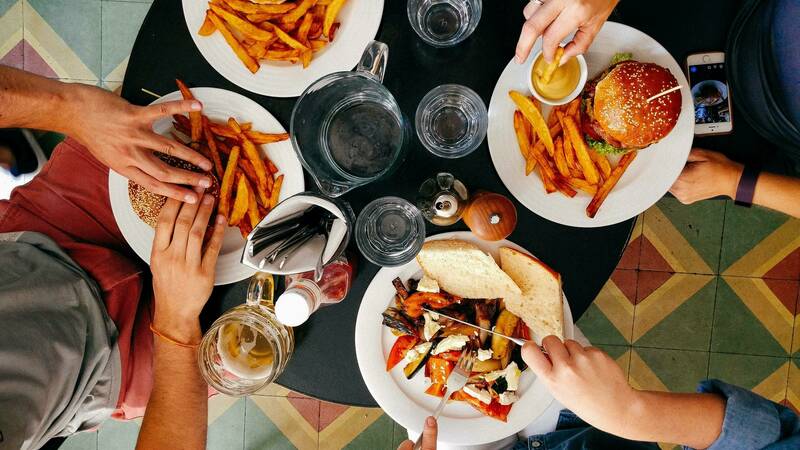Buzzing cafeteria hubbub infiltrates the Christina Perri song coming from the one earbud I have in as I shuffle over to my usual table and plop down in the one empty seat left, the other earbud bobbing on my thigh as I do so. I look out at the warm, familiar faces of all my friends sitting with me, crack a small smile to myself out of thankfulness for their company, and begin digging into my entirely mediocre and rubbery grilled cheese.
My closest buddy since kindergarten, from across the tabletop, throws out into the arena that is our table a crude joke about our science teacher. It's met by the rest of the group with some raucous laughter. The conversation shifts to the fantasy football league we just started up only a few days ago. This is just like any other day this year. Same old same old. I'm bored of it, I think to myself. Before I can even finish the thought, I hear something that makes every fiber of my being freeze in its place as if someone is dunking my entire body into a tank of hissing liquid nitrogen. One word, cutting into me like sharp frost crystals on tender evergreen leaves in winter.
I only catch the lonesome word, echoing against the boring beige brick walls of our cafeteria like the noise made when you toss a pebble down the Grand Canyon—no fragmented phrase of whatever came before or after. Just the word. "Gay." I feel as if I'm submerged under an icy lake with no capacity to hear anything but the deafening pounding in my ears until my adjacent friend jostles me, bringing me back to the dull droning of the cafeteria. The sound rushes back to my ears just in time for me to hear my best friend from across the table: "You are gay, right?" I feel that sentence zip across the table and hit me in the face with a sting, like a thick rubber band shot with malice. I don't even know what to say or do. My mouth sours and opens but nothing comes out, and I'm left gaping like a rotten-wooden ventriloquy puppet with no puppeteer.
"Well, no offense, it's just like, you know, you kind of act like it. And your voice sounds like it," he continues.
"Like what?" I croak out through a twisted-up throat.
"You know—like a faggot," he says, with not even a notion of caution. "Gay" threw me for a loop, but the harshness of this word he spits out makes me click into survival mode. I instantly begin spouting negations, but for every argument I have, the table has seven more of their own. In the blink of an eye, the boys I thought were my closest friends morph into unfamiliar monstrous faces. A seven-headed hydra stares me down, looking to identify and eradicate anything different from itself. I am at a loss. I feel numb. Is this what people mean when they say they have an out-of-body experience? I can see myself sitting at the table, looking small and meager in comparison to the force opposite me. Our table sits next to the railing that fences in an auditorium pit a floor lower than us, and I just want to scream at myself to hurdle my body over the cold, cream-colored metal bars into a hopefully never-ending abyss. I try to regain control of the situation but it's hopeless.
I hear "you act like such a girl," "only gay people do plays," "it just makes sense, sorry," "don't deny it, we know," and much worse. I choke on my words as rivulets of hot tears come streaming from my eyes.
"Look, now he's crying. He's definitely gay."
Staring down at the floor, I rack my brain to figure out why people who I call friends were doing this to me. How can people who used to make me feel so at home now force me into such isolation? After coming up with no good answer, I look back up and out, rub my tears with my sweater sleeve, and stand to leave.
I stumble over to the peanut-free table. If I didn't feel like a part of my chest had just been ripped out of me and punted across the recess field, leaving a bloody cavity where my heart should be, I would laugh at the thought of me crying at the peanut-fucking-free table.
Discussion Questions
- Should “Out At Lunch” best be labeled a “displacement” or an “incarceration” narrative? Why so?
- Comment on Gabe’s use of figurative language. To what extent do his similes and metaphors “work” to paint a vivid picture? In your view, where might he have overdone it?
- To what extent does Gabe’s verb choice and use of alliteration serve to help him meet the terms of the assignment? In this regard, what alterations would you make, so as to more fully bring this piece to life?
- Which rhetorical virtues do you see most at work here?
- How did Gabe make you feel as you read his narrative? Specifically what did he do to create this feeling?
- What other aspects of the narrative are worth pointing to?

